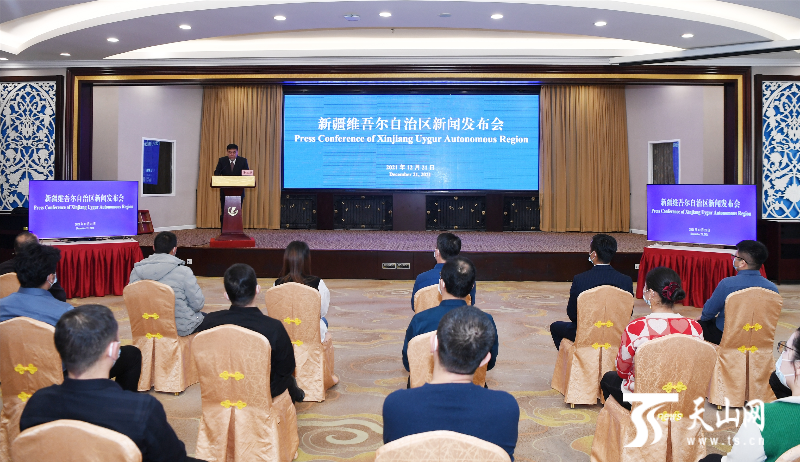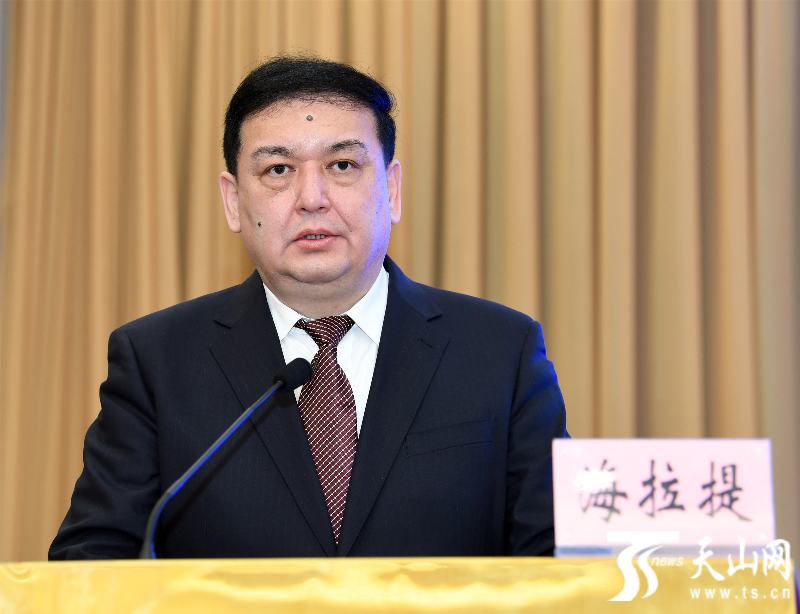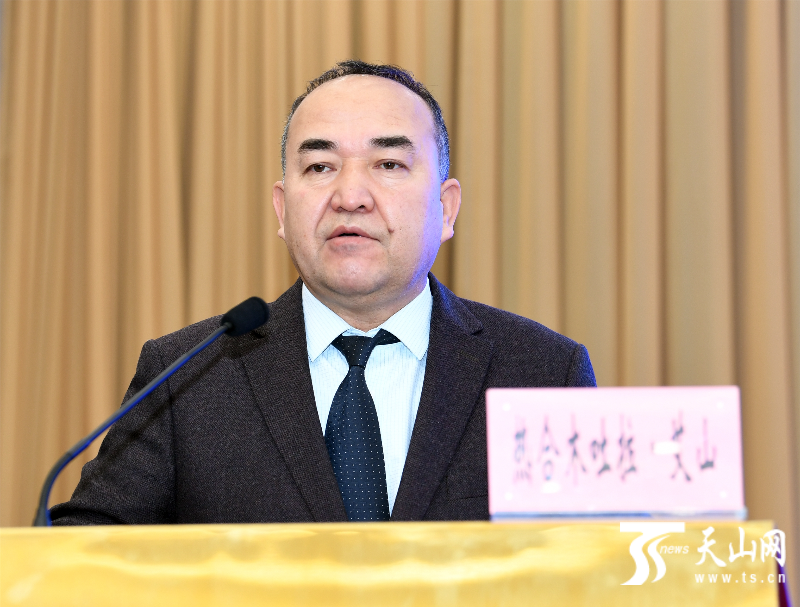The Press Conference of Xinjiang Uygur Autonomous Region on Refuting “Forced Labor”
December 21, 2021

Photo taken on December 21, 2021 shows the press conference of Xinjiang Uygur Autonomous Region on refuting “forced labor”. Photo by Xinjiang Daily/ Zhou Peng

Photo taken on December 21, 2021 shows Hailati, the host of the press conference of Xinjiang Uygur Autonomous Region on refuting“forced labor”. Photo by Xinjiang Daily/ Zhou Peng
Host:Hello, fellow media reporters! Welcome to the press conference of Xinjiang Uygur Autonomous Region on refuting “forced labor”. I’m Hailati, the host of this press conference.
Work creates the means of existence and is an essential human activity. Work creates a better life and enables all-around human development and the progress of civilization. The Constitution of the People’s Republic of China provides that all citizens have the right and obligation to work. To protect the right to work is to safeguard human dignity and human rights.
In fact, Xinjiang, China insists on facilitating employment as the most fundamental project for ensuring and improving people’s well-being. It insists on the well-combined employment principle of encouraging individual initiative, regulatory role of the market and government policies facilitating employment, and encouragement of entrepreneurship. It increases employment and secures it by all means. Thanks to the active employment policies, the material, cultural and living standards of people of all ethnic groups in Xinjiang has been continuously improved, and all human rights have been effectively protected and developed.
For some time, the anti-China forces of the United States and several western countries wantonly hype up the so-called “forced labor” in Xinjiang and smear employment security in Xinjiang in disregard of the great efforts it has made in safeguarding human rights. Their remarks as such are completely groundless and do not hold water at all because they are typical slander and defamation. In fact, people of all ethnic groups in Xinjiang choose occupations of their own will. After they are employed in various kinds of enterprises, they sign labor contracts with the companies in accordance with the law and establish labor relation protected by the law and their freedom has never been restricted in any way. Workers of all ethnic groups enjoy equal pay for equal work and have medical insurance, endowment insurance, unemployment insurance, insurance against injuries at work, birth insurance and pension. Their customs, freedom of religious beliefs and the rights to use their own spoken and written languages are fully respected and safeguarded.
First of all, let’s invite Rahmutulla Hasan, professor of School of History, Xinjiang University to share his views with us.

Photo taken on December 21, 2021 shows Rahmutulla Hasan speaks at the press conference of Xinjiang Uygur Autonomous Region on refuting“forced labor”. Photo by Xinjiang Daily/ Zhou Peng
Rahmutulla Hasan: The anti-China forces in the United States and several western countries slander that there’s so-called “forced labor” in Xinjiang, defaming and attacking Xinjiang. This hurts the feelings of the Chinese people, the people in Xinjiang greatly. It’s of sinister intention and its fundamental purpose is to sabotage the prosperity and stability of Xinjiang and do harm to the historical process of realizing the great rejuvenation of the Chinese nation. Being a Uygur intellectual, I am very indignant at it and resolutely oppose it!
Firstly, there’s no so-called “forced labor” at all in Xinjiang. The allegation that “the Uygurs in Xinjiang are oppressed and forced labor”is an outright lie. The attacks of the anti-China forces in the United States and several western countries are simply making excuses for their intentional interference in China’s internal affairs regardless of facts and by confounding black and white. In fact, stabilizing employment and safeguarding people’s livelihood are important guarantees for the Chinese government to achieve sustained and stable economic development. It is also of great significance to Xinjiang’s long-term stability and benefits of people of all ethnic groups. People in Xinjiang have the say as to the real situations of employment here.
China is a country governed by the rule of law. According to the provisions and related administrative regulations, including the Labor Law and Labor Contract Law of the People’s Republic of China, employees sign labor contracts with the companies based on the principles of equality, voluntariness and consensus and get remuneration no matter what their ethnicity, race, gender, or religious beliefs are. Workers of all ethnic groups in Xinjiang choose their occupations according to their own will based on the principle of equality and voluntariness and sign labor contracts with related companies and get remuneration. They are completely free to decide where to work. How come there’s so-called “forced labor”?
Since 2016 I have done field surveys in the four prefectures in southern Xinjiang very often and interviewed several hundreds of farmers and migrant workers. They’ve shared their stories of employment with me. For example, Pazyeyan Tuerxun, a 23 year old girl from Hotan Prefecture said, “ I came to work in Aksu Prefecture in 2017 and a year later, my salary raised to more than RMB 5,000 from over RMB 2,000 in the first year, thus improving my life and that of my family with success.” Tunishahan Tuohut, a farmer of Bostan Township, Cele County said, “In 2018, I went to Qiemo County to pick cotton and earned more than RMB 9,000 in two months. The cotton growers paid for my transportation. They were nice to me and provided me with free food and lodging. I was paid on a daily basis. They taught me how to pick cotton quickly so that I could make more money. After I was back home, I bought new clothes for my husband and three children and a washing machine for my family.” Ayimusha Tuerxun, an employee of a textile company in Aksu Prefecture said, “ In February 2019, I volunteered to apply for the job at a factory in the textile city of Aksu and became a textile worker. I loved the job the first day I came to the factory. As the benefits of the factory are very favorable, we are taken good care of and the working atmosphere is also relaxing and joyful, I decide to keep on working at the factory and earn money to live a good life.”Every employee I interviewed is very satisfied with their present job and happy life.
Secondly, Xinjiang adheres to employment as the the biggest livelihood project. Xinjiang always puts the safety and well-being of people of all ethnic groups as the most important matter, insists on giving priority to people’s livelihood as its first concern, insists on spending more than 70% of the regional financial expenditures and the pair assistance funds on safeguarding and improving people’s livelihood, and continues to promote a number of projects to benefit people in employment and education, so that people of all ethnic groups experience deeply the care and warmth from the CPC Central Committee. My hometown is in Hotan and great changes have taken place there. I am thrilled at seeing villagers live a happy and wonderful life. The legal labor rights of people of all ethnic groups in Xinjiang are protected by the law. There’s no so-called “forced labor” fabricated by those with ulterior intention at all.
Thirdly, the allegations made by the anti-China forces in the United States and several western countries are groundless. Although they point fingers at Xinjiang under the pretext of human rights, this card is not easy to play because its own notorious history in human rights is plain to all. Take forced labor as an example. Although the slavery system was abolished in 1865 in the United States, its baneful influences are still deeply-rooted in the society. According to the statistics of some US academic institutions, at least 500,000 people are victims of modern enslavement and are forced to labor. The United States has not signed most of the international labor conventions yet and it is the country of origin of many counts including sweat shops, illegal child labor and human trafficking etc.. Moreover, ethnic minorities in the United States have to face systematic barrier of employment......Evidences as such prove that the United States is the country that seriously violates workers’ human rights, ethnic minorities in particular and where forced labor exists truly.
The lie fabricated by the anti-China forces in the United States and several western countries will definitely expose itself in front of facts of the stable development in Xinjiang. The sinister remarks the anti-China forces in the United States and several western countries make will definitely be swept into the dustbin of history. No matter how the anti-China forces in the United States and several western countries lie, cheat, or stir up enmity, they won’t disrupt the good situation of social stability of Xinjiang, disturb the wonderful life of people of all ethnic groups in Xinjiang.
Host: Thank professor Rahmutulla Hasan for your speech. Abliz Adi is a driver of agricultural machinery. In September 2019, he bought a tractor harvester with which he made money by plowing in spring and harvesting corn in autumn. The tractor harvest alone enables him to earn RMB 60,000 annually. Besides, he grows 370 mu of cotton and over 200 mu of wheat. As mechanized planting and management save time and money, his life is getting better and better and he is an expert of getting better off in the village. Now let’s watch a video about Abliz Adi’s story.
Host: Bulekez Yeminjan of Biestuobie Township, Xinyuan County,Ili Prefecture runs a barbecue shop at the township and has favorable income. She is able to take care of her family when having a business of her own. She goes travelling around with her family sometimes.She is very satisfied with her life now. She said, she has never seen such a thing as so-called “forced labor” as she has been living in Xinjiang for thirty years. Now, let’s watch what Bulekez Yeminjan wants to share with us.
Host: Baerhengul Tuoliu is the head of garment sewing team of Jiuweihu Garment Co.,Ltd.,Tuoli County,Tacheng Prefecture.She and her co-workers have increased their income and improved their living standards because of their hard work. She said,there’s no such thing as so-called “forced labor” in Xinjiang at all. The anti-China forces in the United States and several western countries please stop spreading rumors. Now let’s watch Baerhengul Tuoliu’s story.
Host:Abudukerem Abudureyim was a teacher and later pursued his dream of startup. Now he has several startup projects,lives a happy life and is full of aspirations to the future. He said, there’s never so-called “forced labor” in Xinjiang and he has the most say in terms of this. Now let’s watch a video to see Abudukerem Abudureyim’s story.
Host: Mamut Ablikem is a bus driver of Akiq County, Kizilsu Prefecture. He earns a salary of RMB5,000 and his father and younger brother run a naan shop downtown in the county which is doing great. Now they live a stable and happy life. Now let’s watch a video of Mamut Ablikem’s story.
Host: Mamtimin Samar is incharge of Jinniu Farmers’ Live-stocking Raising Cooperative in Zepu County, Kashgar Prefecture. After graduation from college, he came back to his hometown and set up the live-stocking raising cooperative for development. During startup, he has benefited from government policies of interest-free loans for many times. After years of hard work, as the scale of his cooperative keeps expanding, now it has 1,000 sheep and 300 cows. Now let’s watch a video of Mamtimin Samar’s story.
Host: Xinjiang implements earnestly the twenty-six international labor conventions including the four core conventions such as Convention on the Elimination of Discrimination in Employment and Occupation and the related international provisions such as the UN’s International Covenant on Economic, Social and Cultural Rights to safeguard workers’ rights and oppose forced labor. With the in-depth application of a series of governmental policies on employment, the living standards of people of all ethnic groups in Xinjiang has been improved remarkably. Xinjiang’s implementation of policies safeguarding employment and related practices are in compliance with both the Chinese Constitution and related laws and regulations and international labor and human rights standards. The allegation of so-called “forced labor” in Xinjiang is made out of ulterior intention if not out of ignorance.
We are telling the anti-China forces in the United States and several western countries to respect basic facts, stop slandering and defaming human rights in Xinjiang, stop interfering with China’s internal affairs and stop disturbing the stability and prosperity in Xinjiang. People of all ethnic groups in Xinjiang enjoy rights for equal employment, access to pay, rest and vocation etc..They are very indignant at the slander and defamation the anti-China forces in the United States and several western countries made on Xinjiang and are eager to voice their indignation in public. Now let’s listen to several people’s accounts.
Host: Just now, through an expert’s speech and seven video clips you may see the facts that people of all ethnic groups in Xinjiang enjoy equal rights in employment and their legal rights and benefits are safeguarded in accordance with the law. These facts form strong contrast with the lie fabricated by the anti-China forces in the United States and several western countries. We are convinced that seeing is believing as to whether Xinjiang is good or not. People in Xinjiang have the most say as to whether Xinjiang is good or not.
Facts and truth are the most powerful rumor crusher. Xinjiang has always taken respecting workers’ will as an important basis for broadening employment channels and conducting employment training. It has guaranteed workers’ basic rights to equal employment, remuneration, rest and vocation, occupational safety, access to social insurances, and freedom of religious beliefs in accordance with the law to ensure that workers are not discriminated against on the basis of their ethnicity, region, gender, or religious beliefs, nor are they restricted on the basis of urban or rural areas, occupation, or status. The government strives to improve employment policies, build employment information platform with great efforts, and create a favorable labor and employment environment. It creates favorable conditions so that people of all ethnic groups find satisfactory jobs and obtain stable income, and in so doing, it maximizes protection of the labor and employment rights of people of all ethnic groups.
Host:That’s the end of this press conference. Thank professor Rahmutulla Hasan and all the media friends for your attendance.








